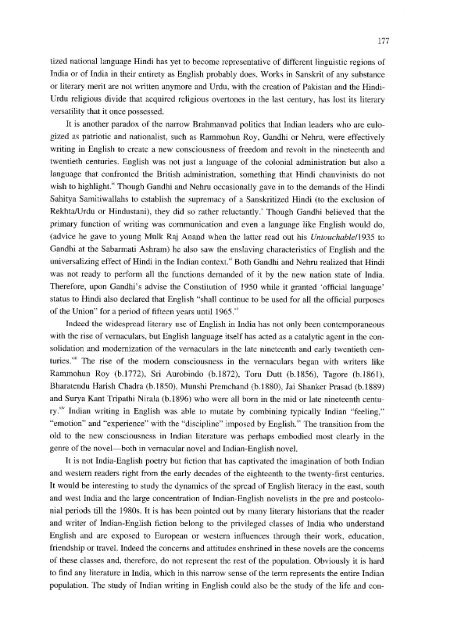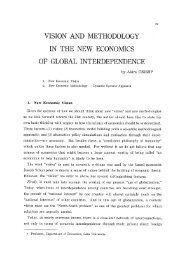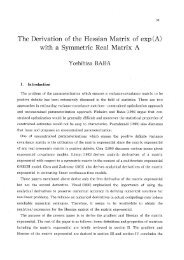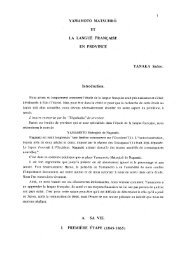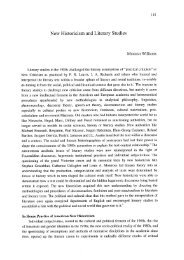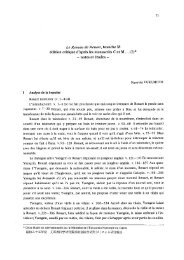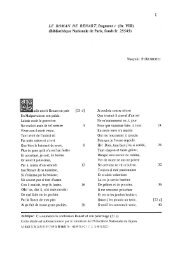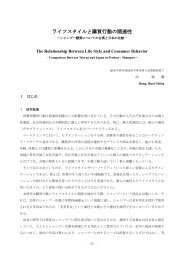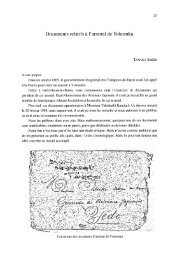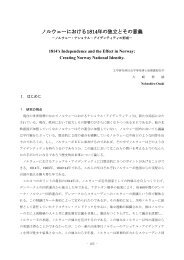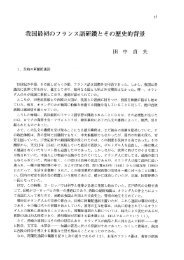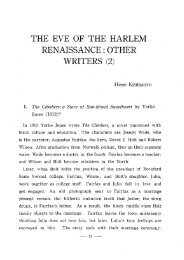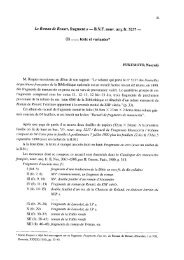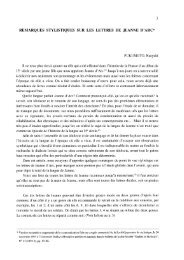Indian Writing in English 1794-2004 - Soka University Repository
Indian Writing in English 1794-2004 - Soka University Repository
Indian Writing in English 1794-2004 - Soka University Repository
Create successful ePaper yourself
Turn your PDF publications into a flip-book with our unique Google optimized e-Paper software.
tized national language H<strong>in</strong>di has yet to become representative of different l<strong>in</strong>guistic regions of<br />
India or of India <strong>in</strong> their entirety as <strong>English</strong> probably does. Works <strong>in</strong> Sanskrit of any substance<br />
or literary merit are not written anymore and Urdu, with the creation of Pakistan and the H<strong>in</strong>di-<br />
Urdu religious divide that acquired religious overtones <strong>in</strong> the last century, has lost its literary<br />
versatility that it once possessed.<br />
It is another paradox of the narrow Brahmanvad politics that <strong>Indian</strong> leaders who are eulo-<br />
gized as patriotic and nationalist, such as Rammohun Roy, Gandhi or Nehru, were effectively<br />
writ<strong>in</strong>g <strong>in</strong> <strong>English</strong> to create a new consciousness of freedom and revolt <strong>in</strong> the n<strong>in</strong>eteenth and<br />
twentieth centuries. <strong>English</strong> was not just a language of the colonial adm<strong>in</strong>istration but also a<br />
language that confronted the British adm<strong>in</strong>istration, someth<strong>in</strong>g that H<strong>in</strong>di chauv<strong>in</strong>ists do not<br />
wish to highlight.'x Though Gandhi and Nehru occasionally gave <strong>in</strong> to the demands of the H<strong>in</strong>di<br />
Sahitya Samitiwallahs to establish the supremacy of a Sanskritized H<strong>in</strong>di (to the exclusion of<br />
Rekhta/Urdu or H<strong>in</strong>dustani), they did so rather reluctantly.' Though Gandhi believed that the<br />
primary function of writ<strong>in</strong>g was communication and even a language like <strong>English</strong> would do,<br />
(advice he gave to young Mulk Raj Anand when the latter read out his Untouchable/1935 to<br />
Gandhi at the Sabarmati Ashram) he also saw the enslav<strong>in</strong>g characteristics of <strong>English</strong> and the<br />
universaliz<strong>in</strong>g effect of H<strong>in</strong>di <strong>in</strong> the <strong>Indian</strong> context.' Both Gandhi and Nehru realized that H<strong>in</strong>di<br />
was not ready to perform all the functions demanded of it by the new nation state of India.<br />
Therefore, upon Gandhi's advise the Constitution of 1950 while it granted `official language'<br />
status to H<strong>in</strong>di also declared that <strong>English</strong> "shall cont<strong>in</strong>ue to be used for all the official purposes<br />
of the Union" for a period of fifteen years until 1965.—<br />
Indeed the widespread literary use of <strong>English</strong> <strong>in</strong> India has not only been contemporaneous<br />
with the rise of vernaculars, but <strong>English</strong> language itself has acted as a catalytic agent <strong>in</strong> the con-<br />
solidation and modernization of the vernaculars <strong>in</strong> the late n<strong>in</strong>eteenth and early twentieth cen-<br />
turies.— The rise of the modern consciousness <strong>in</strong> the vernaculars began with writers like<br />
Rammohun Roy (b.1772), Sri Aurob<strong>in</strong>do (b.1872), Toru Dutt (b.1856) , Tagore (b.1861),<br />
Bharatendu Harish Chadra (b.1850), Munshi Premchand (b.1880), Jai Shanker Prasad (b.1889)<br />
and Surya Kant Tripathi Nirala (b.1896) who were all born <strong>in</strong> the mid or late n<strong>in</strong>eteenth centu-<br />
ry.''" <strong>Indian</strong> writ<strong>in</strong>g <strong>in</strong> <strong>English</strong> was able to mutate by comb<strong>in</strong><strong>in</strong>g typically <strong>Indian</strong> "feel<strong>in</strong>g ,"<br />
"emotion" and "experience" with the "discipl<strong>in</strong>e" imposed b y <strong>English</strong>."" The transition from the<br />
old to the new consciousness <strong>in</strong> <strong>Indian</strong> literature was perhaps embodied most clearly <strong>in</strong> the<br />
genre of the novel—both <strong>in</strong> vernacular novel and <strong>Indian</strong>-<strong>English</strong> novel.<br />
It is not India-<strong>English</strong> poetry but fiction that has captivated the imag<strong>in</strong>ation of both <strong>Indian</strong><br />
and western readers right from the early decades of the eighteenth to the twenty-first centuries.<br />
It would be <strong>in</strong>terest<strong>in</strong>g to study the dynamics of the spread of <strong>English</strong> literacy <strong>in</strong> the east, south<br />
and west India and the large concentration of <strong>Indian</strong>-<strong>English</strong> novelists <strong>in</strong> the pre and postcolo-<br />
nial periods till the 1980s. It is has been po<strong>in</strong>ted out by many literary historians that the reader<br />
and writer of <strong>Indian</strong>-<strong>English</strong> fiction belong to the privileged classes of India who understand<br />
<strong>English</strong> and are exposed to European or western <strong>in</strong>fluences through their work, education ,<br />
friendship or travel. Indeed the concerns and attitudes enshr<strong>in</strong>ed <strong>in</strong> these novels are the concerns<br />
of these classes and, therefore, do not represent the rest of the population. Obviously it is hard<br />
to f<strong>in</strong>d any literature <strong>in</strong> India, which <strong>in</strong> this narrow sense of the term represents the entire <strong>Indian</strong><br />
population. The study of <strong>Indian</strong> writ<strong>in</strong>g <strong>in</strong> <strong>English</strong> could also be the study of the life and con-<br />
177


